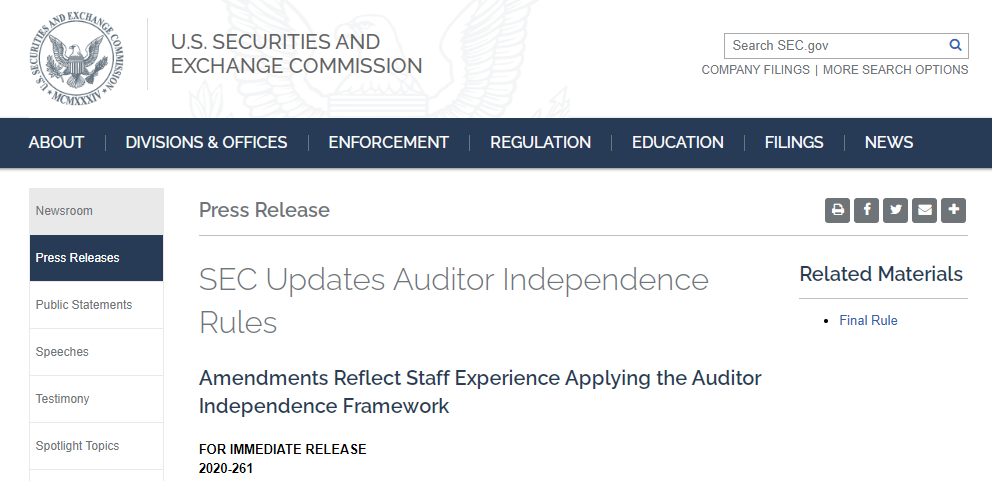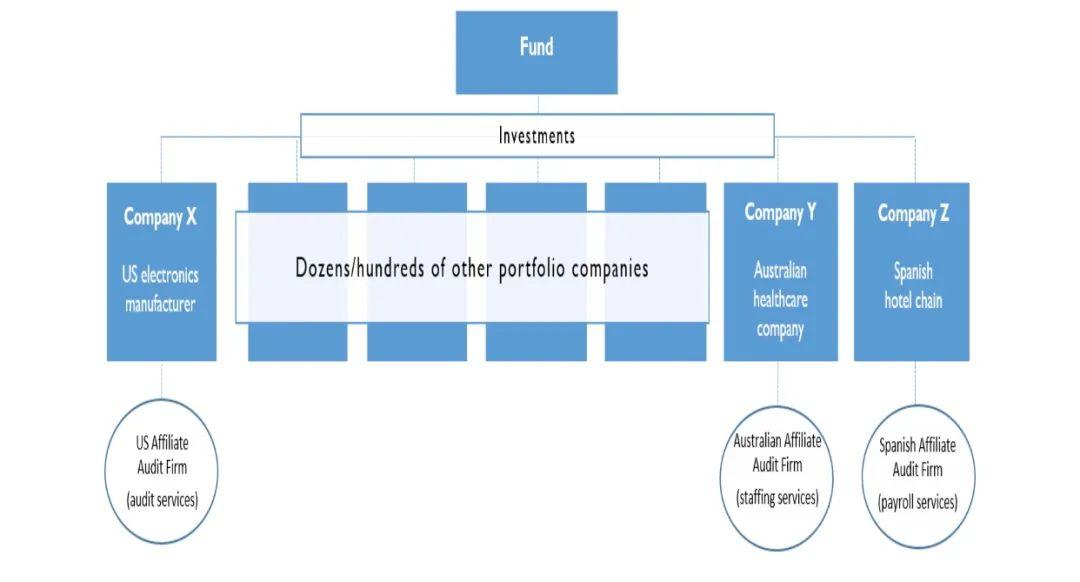来源 | 继民财经汇

SEC更新审计师独立规则(中文翻译仅供参考,后附英文原文为准)
https://www.sec.gov/news/press-release/2020-261
修订反映了专业人员在采用审计师独立框架方面的经验
即刻发布2020-261
对规则2-01的修订
,2020年10月16日会计师资格
-
澳大利亚审计公司A的一家澳大利亚关联公司在短时间内为满足资源需求的Y公司(一家位于澳大利亚的医疗保健投资公司)提供了有限的人员配置服务。 -
审计公司A的西班牙分支机构在短时间内为总部位于西班牙的住宿(酒店连锁)投资公司Z公司提供工资服务。 -
X公司拥有自己独立的治理结构,与Y公司或Z公司无关,而Y公司和Z公司对基金F并不重要。

-
修改规则2-01(f)(4)中的“审计客户的会员关系”和规则2-01(f)(14)中的“投资公司综合体”的定义,以解决某些会员关系,包括共同控制下的实体; -
修改“审计和职业参与期”的定义,特别是细则2-01(f)(5)(iii),以缩短回溯期,以便国内首次申报者评估对独立性要求的遵守情况; -
修改规则2-01(c)(1)(ii)(A)(1)和(E),以将某些学生贷款和最低限度的消费贷款添加到从损害独立性的贷款关系中排除的类别中; -
修改规则2-01(c)(3),以具有重大影响的实益拥有人的概念替换业务关系规则中对“主要股东”的引用; -
用新的规则2-01(e)替换规则2-01(e)中过时的过渡条款,以引入过渡框架,以解决仅由于合并或收购交易而引起的无意中违反独立性的行为;和 -
进行其他一些其他更新。
SEC Updates Auditor Independence Rules
Amendments Reflect Staff Experience Applying the Auditor Independence Framework
2020-261
Amendments to Rule 2-01, Qualification of Accountants
October 16, 2020
-
An Australian affiliate of Audit Firm A provides limited staffing services to Company Y –– a healthcare portfolio company based in Australia –– for a short-period of time to meet a resource need. -
A Spanish affiliate of Audit Firm A provides payroll services to Company Z – a lodging (hotel chain) portfolio company based in Spain – for a short-period of time. -
Company X has its own separate governance structure that is unrelated to Company Y or Z, and Company Y and Z are not material to Fund F.

-
Amend the definitions of “affiliate of the audit client,” in Rule 2-01(f)(4), and “investment company complex,” in Rule 2-01(f)(14), to address certain affiliate relationships, including entities under common control; -
Amend the definition of “audit and professional engagement period,” specifically Rule 2-01(f)(5)(iii), to shorten the look-back period, for domestic first time filers in assessing compliance with the independence requirements; -
Amend Rule 2-01(c)(1)(ii)(A)(1) and (E) to add certain student loans and de minimis consumer loans to the categorical exclusions from independence-impairing lending relationships; -
Amend Rule 2-01(c)(3) to replace the reference to “substantial stockholders” in the business relationships rule with the concept of beneficial owners with significant influence; -
Replace the outdated transition provision in Rule 2-01(e) with a new Rule 2-01(e) to introduce a transition framework to address inadvertent independence violations that only arise as a result of a merger or acquisition transactions; and -
Make certain other miscellaneous updates.
普华永道PwC合伙人,出任美国证监会(SEC)副总会计师,分管PCAOB
美国证监会(SEC)奖励一名「举报人」5,000万美元,创历史记录


